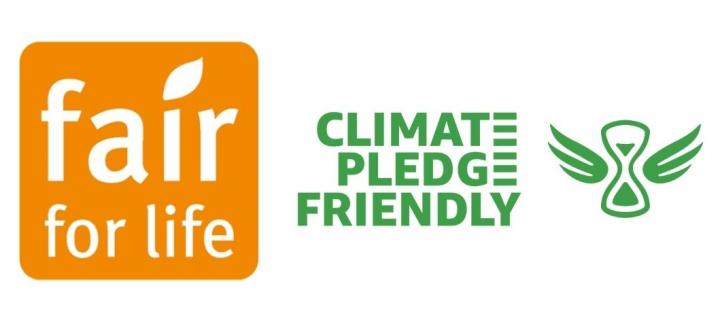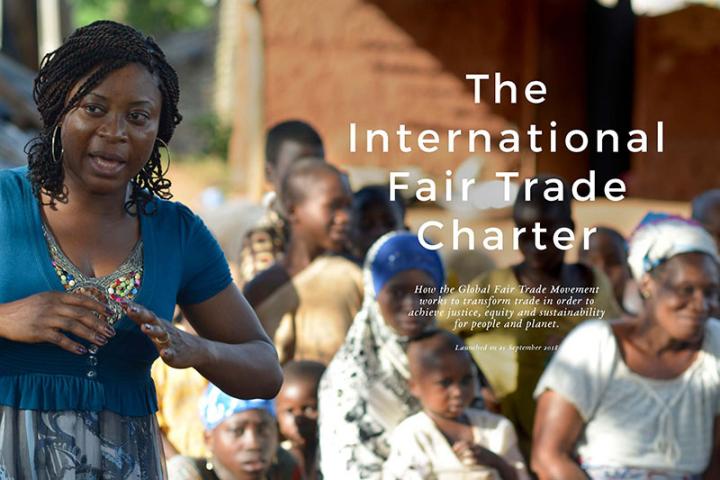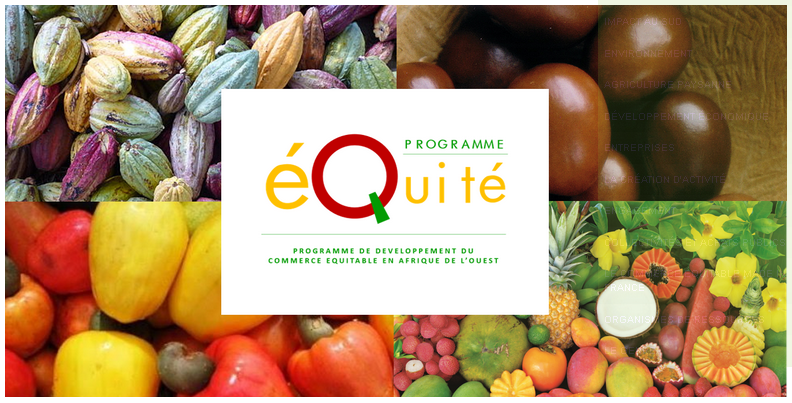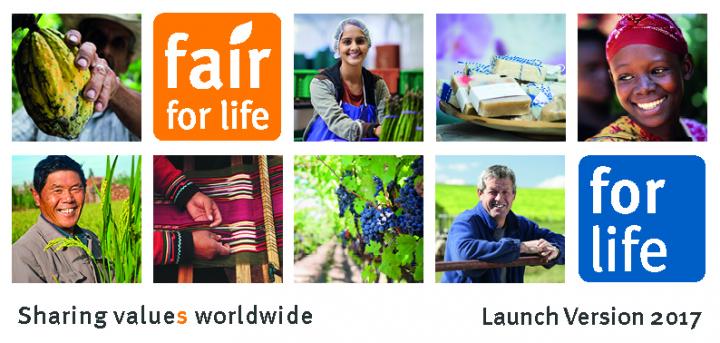News & communication
Fair for Life certified products are now easily identifiable on Amazon
With consumers looking more and more to purchase online due to the coronavirus pandemic, helping them to identify sustainable businesses and products is more important than ever.
That’s why the
Fair for Life certification is now highlighted on one of the world’s leading online retailers, Amazon, through its program “Climate Pledge Friendly’, designed to make it easier for customers to discover and shop on-line for more sustainable products.
Recognized as an effective tool to mitigate climate change, thanks to fair trade principles applied at each step of the supply chains, Fair for life has been selected by Amazon as one of the 31 recognized certifications included in the Climate Pledge Friendly program.
Fair for Life certified products already available on Amazon will now have the Climate Pledge Friendly tag added to the search results. Shoppers can do a targeted search for Climate Pledge Friendly products in order to easily identify products that meet sustainability standards, such as Fair for Life, and help preserve the natural world.
Marie Mercui, head of the CSR and Fair Trade department of ECOCERT says:
“We are excited to be part of Amazon’s Climate Pledge Friendly program thus highlighting the Fair for Life commitment of brands and enabling responsible shopping on-line. As it becomes easier to recognize and to buy fair trade certified products for consumers, it also means that in return producers can improve their livelihoods with decent working conditions and fair prices. They can put in place better practices that fight climate change, such as avoiding deforestation for agriculture.
The more fair trade products are sold, the more trade becomes a driving force for positive and sustainable change benefiting people and their environment; that’s the Fair for Life vision since its creation.”

(12.10.2021/ih)
With consumers looking more and more to purchase online due to the coronavirus pandemic, helping them to identify sustainable businesses and products is more important than ever.
That’s why the Fair for Life certification is now highlighted on one of the world’s leading online retailers, Amazon, through its program “Climate Pledge Friendly’, designed to make it easier for customers to discover and shop on-line for more sustainable products.
Recognized as an effective tool to mitigate climate change, thanks to fair trade principles applied at each step of the supply chains, Fair for life has been selected by Amazon as one of the 31 recognized certifications included in the Climate Pledge Friendly program.
Fair for Life certified products already available on Amazon will now have the Climate Pledge Friendly tag added to the search results. Shoppers can do a targeted search for Climate Pledge Friendly products in order to easily identify products that meet sustainability standards, such as Fair for Life, and help preserve the natural world.
Marie Mercui, head of the CSR and Fair Trade department of ECOCERT says:
“We are excited to be part of Amazon’s Climate Pledge Friendly program thus highlighting the Fair for Life commitment of brands and enabling responsible shopping on-line. As it becomes easier to recognize and to buy fair trade certified products for consumers, it also means that in return producers can improve their livelihoods with decent working conditions and fair prices. They can put in place better practices that fight climate change, such as avoiding deforestation for agriculture.
The more fair trade products are sold, the more trade becomes a driving force for positive and sustainable change benefiting people and their environment; that’s the Fair for Life vision since its creation.”
That’s why the Fair for Life certification is now highlighted on one of the world’s leading online retailers, Amazon, through its program “Climate Pledge Friendly’, designed to make it easier for customers to discover and shop on-line for more sustainable products.
Recognized as an effective tool to mitigate climate change, thanks to fair trade principles applied at each step of the supply chains, Fair for life has been selected by Amazon as one of the 31 recognized certifications included in the Climate Pledge Friendly program.
Fair for Life certified products already available on Amazon will now have the Climate Pledge Friendly tag added to the search results. Shoppers can do a targeted search for Climate Pledge Friendly products in order to easily identify products that meet sustainability standards, such as Fair for Life, and help preserve the natural world.
Marie Mercui, head of the CSR and Fair Trade department of ECOCERT says:
“We are excited to be part of Amazon’s Climate Pledge Friendly program thus highlighting the Fair for Life commitment of brands and enabling responsible shopping on-line. As it becomes easier to recognize and to buy fair trade certified products for consumers, it also means that in return producers can improve their livelihoods with decent working conditions and fair prices. They can put in place better practices that fight climate change, such as avoiding deforestation for agriculture.
The more fair trade products are sold, the more trade becomes a driving force for positive and sustainable change benefiting people and their environment; that’s the Fair for Life vision since its creation.”

(12.10.2021/ih)
FFL & FL certification during the COVID-19 pandemic
Fair for Life (FFL) & For Life (FL) implement adapted audit measures to address the challenges imposed by the Covid-19 pandemicThe COVID-19 pandemic continues to spread rapidly across the world and the Fair for Life and For Life team sends its support to those affected and those working towards containment. We sincerely hope all stay safe in these difficult times!
Due to the pandemic, vast areas of the world are subject to travel restrictions and precautionary measures are implemented to stop the spreading of the virus. ECOCERT as the scheme owner of FFL and FL is continuing to monitor government and other external advice to assess the risks following the outbreak and rapid spread of the coronavirus disease 2019 (COVID-19).
The pandemic results in various challenges for the delivery of our high-standard certification service, which relies to an essential part on annual on-site visits of certified operations:
- The health and safety of producers, staff of certified operations and auditors could be compromised during on-site audits;
- The international nature of the service with frequent locomotion of auditors potentially contributes to the further spread of the virus;
- National governments have imposed strict rules to decrease the spread of the virus;Logistical restrictions: Transport and accommodation may not be available for auditors depending on the local rules;
- Certified operations may be forced to pause their activities temporarily; and
- Unclear developments for the coming months regarding the possibility of doing on-site audits and the difficulty to plan the annual audits merely through postponement.
How can certified operations to secure their certification and continue their FFL / FL sales, when on-site audits are not possible?
In order to react to the abovementioned challenges the Fair for Life Team developed a temporary procedure to provide a framework to Certification Bodies for adapted audit measures during the pandemic. In this context, the possibility of remote audits for the annual FFL & FL controls is strengthened:
-
Until 31st December 2020, whenever an on-site audit is not possible for one or more of the above reasons, it can be replaced fully or partially with remote audits under specified conditions and based on risk-assessments carried out by the Certification Body. An additional on-site audit after the pandemic may be required.
Remote audits have already been a part of the FFL & FL Standards, but were restricted to specific settings, such as small trade offices or operations with an excellent performance, and to surveillance audits only. In the context of the pandemic, the applicability of such remote audits has been extended. While remote audits present a limited means to confirm compliance of certified operations, a temporary exception is made in order to ensure that certified operations can continue to sell their products as FFL / FL to their customers, even when the on-site audit is not possible.
- Where a remote audit is not possible, the annual audit can be postponed. In this case, the issued certificates remain valid, as long as the annual audit is carried out before the end of the current calendar year.
How will certification requirements be assessed whose fulfilment is impeded due to the pandemic?
The Fair for Life & For Life Standards follow an adapted and contextualized approach: While the principles to be followed by certified operations are clearly defined, the exact way in which these are implemented may differ according to the specific context. Therefore, the fulfilment of the standard requirements during this pandemic will be assessed considering the local context and the taken efforts to ensure continuous compliance within a changing environment, just as is done during ‘normal’ times.
Can the Fair Trade Development Fund be used for supporting measures to protect workers and/or producers and/or to relief their financial challenges during this time?
The context-oriented approach of FFL helps operations to adapt their processes for the use and administration of the Fair Trade Fund in these difficult times. FFL believes that the best persons to know how to spend the Fair Trade Fund are the beneficiaries. Within the limits defined by the Standard, beneficiaries are autonomous in deciding how identified needs are best addressed. In the context of the pandemic, they are encouraged to re-assess needs and challenges and adapt the use of the Fund during this time, if deemed relevant. This being said, Producer Operations must ensure that the decisions on the Fund are made by the beneficiaries (or their representatives), as prescribed by the Standard, even facing logistical constraints and/or contact restrictions. The possibility to choose between different ways to ensure this (e.g. through a general assembly, through election of representatives etc.) remains, and Producer Operations (in agreement with the beneficiaries) are free to adapt the means within this framework in order to enable an effective decision-making process.
What is expected from certified operations?
While the pandemic certainly presents many challenges for the life of each individual, it will also be a chance to prove the resilience of fair trade supply-chains and strengthen the relevance of the fair trade movement.
Fair for Life is about transparent supply-chains with balanced negotiations, long-term commitments and mutual support – not only in ordinary circumstances. Adhering to the principles especially in these difficult times and demonstrating their responsibility within the supply-chain, Fair for Life certified companies and organizations stand out from the large part of enterprises: by communicating transparently, providing support to suppliers, maintaining contracts, and respecting previously negotiated prices, risks are shared between the actors within the supply-chain.
Likewise, For Life certified companies prove their social responsibility through continuing to implement their commitments regarding ethical purchasing practices and strengthening the ties with their suppliers.
We thank all certified companies and organizations for their extraordinary commitment and are confident that the Fair Trade & CSR community will emerge strengthened from this crisis! For further information, please contact Julia SCHÄFER (julia.schaefer@ecocert.com).
(26.05.20/loh)
Fair for Life Theory of Change
By participating in Fair for Life, you are contributing to lasting, positive change by incorporating ethical, fair and respectful partnerships in your supply-chains to the benefit of producers, workers and their environments.
An Impact Measurement Project has been initiated in order to follow the progress of Fair for Life's goals and gauge opportunities for continuous improvement.
We are pleased to present the first draft of Fair for Life's Theory of Change and invite you to share your feedback. Please download the document here...
Fair for Life's Theory of Change is intended to explain the mechanisms by which FFL is impacting the world and participating in achieving the broad-reaching Sustainable Development Goals.
Fair for Life’s Theory of Change has been created through practical observations as well as an analysis of Fair for Life's vision, commitments and principles.
The Impact Measurement Project will continue to serve us during the coming years to monitor, evaluate and communicate on activities related to the Fair for Life program.
What is a Theory of Change?
It is a causal framework of how and why a change process will happen in a particular context. It shows a pathway between strategies, outputs, outcomes and impacts considering underlying assumptions.
(22.01.19/ih)
International Fair Trade Charter launched
By adopting the new Fair Trade International Charter, Fair for Life has joined the other fair trade actors, worldwide, to confirm a shared vision for a transformation of the international trade.
More information at
www.fair-trade.website

The tenth European edition of the Sustainable Foods Summit took place in Amsterdam on 7-8 June
The Fair for Life attended the Sustainable Food Summit where Sustainability Developments, health impacts, sustainable ingredients, green marketing were the key topics addressed for 2 days in a high-level forum. With sustainability intricately linked to health & wellness, how can the health value of food & beverages be improved? What new sustainable ingredients are emerging? How can such ingredients create innovation? What are marketing best-practices for sustainable products?
The opening session gave an update on sustainability, highlighting some of the pressing challenges facing the food industry. The social entrepreneurship model has been highlighted in particular on how it can be a factor of positive change for the environment and social communities. A case study was devoted to a leading ethical chocolate brand and how it encourages sustainable agriculture and aims to eradicate slavery in cocoa supply chains. The need to move to circular models for nutrients and materials was examined in detail in the panel discussions. With a growing population and scarcity of resources, the food industry faces the challenge of shifting from linear models to more circular models.
The range of sustainable ingredients for food and beverage applications continues to grow. Companies are adding sustainable value to established materials such as flavors and vegetable oils. At the same time, new ingredients are emerging either from new sources or new processes. A growing number of sustainable ingredients are making their way into food and beverage applications. The session on Sustainable Food Ingredients concluded with discussions around sustainable value. What is the best way to add sustainable value to raw materials? Is it through sustainable sourcing, reduced impact and / or a higher nutritional profile, or all in the same time? The intervention of Caryl Levine from LOTUS FOOD, a Fair for Life certified company in the US, was highly applauded. Among other things, Caryl shared his commitment with Simpatik Farmer Cooperative, also Fair for Life certifed, and reported the outstanding work achieved in improving the impact of organic and fair trade rice farming on women in Indonesia.
Since sustainability is closely linked to health and well-being, the third session explored the effects of food products on health. The relationship between sustainable food, health and well-being was stressed out. The concept of sustainable health care has been described. The environmental and health benefits of fruits and vegetables have been highlighted too. Details on sustainable alternatives to the consumption of sugar and meat products associated to health conditions were given. For instance, the project of SUPER MEAT to create a sustainable meat from laboratory culture of chicken cells has illustrated what science could provide as an alternative to increasing and unsustainable consumption of meat worldwide. With Europe having an aging population and many countries struggling to provide public health care, a paradigm shift is needed. Wieke van der Vossen of the Netherlands Nutrition Center presented the successes of developing and using mobile apps to promote sustainable and healthy foods widely.
The final session focused on Green Marketing and featured Green's best practices for sustainable foods, sharing case studies of operators who are riding the green wave. After recalling the ethical and health reasons of stopping meat products consumption, representatives of the most popular vegan and vegetarian movements in Europe presented their labelling schemes. Case studies of sustainable and successful brands were presented, and the maximization of the potential of social media and digital marketing was stressed out. The concluding panel discussed the best ways to communicate green values to modern consumers.
In parallel with the Forum, the presentation of the Sustainable Food Awards took place. The jury's choices were difficult given the great diversity of applications from all continents. The company ALIET GREEN from Indonesia, Fair for Life certified, has been awarded in the Sustainable Ingredients category for its outstanding work on organic and fair trade coconut sugar.
The opening session gave an update on sustainability, highlighting some of the pressing challenges facing the food industry. The social entrepreneurship model has been highlighted in particular on how it can be a factor of positive change for the environment and social communities. A case study was devoted to a leading ethical chocolate brand and how it encourages sustainable agriculture and aims to eradicate slavery in cocoa supply chains. The need to move to circular models for nutrients and materials was examined in detail in the panel discussions. With a growing population and scarcity of resources, the food industry faces the challenge of shifting from linear models to more circular models.
The range of sustainable ingredients for food and beverage applications continues to grow. Companies are adding sustainable value to established materials such as flavors and vegetable oils. At the same time, new ingredients are emerging either from new sources or new processes. A growing number of sustainable ingredients are making their way into food and beverage applications. The session on Sustainable Food Ingredients concluded with discussions around sustainable value. What is the best way to add sustainable value to raw materials? Is it through sustainable sourcing, reduced impact and / or a higher nutritional profile, or all in the same time? The intervention of Caryl Levine from LOTUS FOOD, a Fair for Life certified company in the US, was highly applauded. Among other things, Caryl shared his commitment with Simpatik Farmer Cooperative, also Fair for Life certifed, and reported the outstanding work achieved in improving the impact of organic and fair trade rice farming on women in Indonesia.
Since sustainability is closely linked to health and well-being, the third session explored the effects of food products on health. The relationship between sustainable food, health and well-being was stressed out. The concept of sustainable health care has been described. The environmental and health benefits of fruits and vegetables have been highlighted too. Details on sustainable alternatives to the consumption of sugar and meat products associated to health conditions were given. For instance, the project of SUPER MEAT to create a sustainable meat from laboratory culture of chicken cells has illustrated what science could provide as an alternative to increasing and unsustainable consumption of meat worldwide. With Europe having an aging population and many countries struggling to provide public health care, a paradigm shift is needed. Wieke van der Vossen of the Netherlands Nutrition Center presented the successes of developing and using mobile apps to promote sustainable and healthy foods widely.
The final session focused on Green Marketing and featured Green's best practices for sustainable foods, sharing case studies of operators who are riding the green wave. After recalling the ethical and health reasons of stopping meat products consumption, representatives of the most popular vegan and vegetarian movements in Europe presented their labelling schemes. Case studies of sustainable and successful brands were presented, and the maximization of the potential of social media and digital marketing was stressed out. The concluding panel discussed the best ways to communicate green values to modern consumers.
In parallel with the Forum, the presentation of the Sustainable Food Awards took place. The jury's choices were difficult given the great diversity of applications from all continents. The company ALIET GREEN from Indonesia, Fair for Life certified, has been awarded in the Sustainable Ingredients category for its outstanding work on organic and fair trade coconut sugar.
The EQUITE program
The Fair for Life team was
in Ivory Coast from the 20th to the 24th of November 2017
to take part in
« the Fair Trade Cocoa Exchange Days»
organized by
the EQUITE program
in partnership with Agronomists and Veterinarians Without Borders (AVSF) and the
Réseau Ivoirien pour le Commerce Equitable
(Ivoirian Network for Fair Trade (RICE).
The EQUITE program is a
project supporting the development of fair trade and family farming in West Africa.

This innovative project started in April 2016 for a period of 3 years and is funded by € 3.9 million by the French Development Agency (AFD) and the French Global Environment Fund (FFEM).
The program supports some
20 fair trade projects in 5 West African countries
(Burkina Faso, Ivory Coast, Mali, Ghana and Togo) in the cocoa, shea, cashew, fruit and handicraft sectors. These projects with a
strong environmental and agro-ecological dimension
will contribute to an ecological and social transition in the production and organization of export sectors.
The program also strengthens existing and emerging national fair trade platforms in these five countries, as well as the regional network Fairtrade Africa - West African Network (FTA-WAN).
The program is led by
La Plate-Forme pour le Commerce Équitable
(PFCE, the French Platform for Fair Trade), now renamed "Fair Trade France".
Ecocert has been a member for several years, and Fair for Life is a well-known guarantee system.
Projects are managed by a consortium composed of Agronomists and Veterinarians Without Borders (AVSF) as lead partner and Fairtrade Africa - West Africa Network (FTA-WAN).
Four Ecocert fair trade certified cooperatives are beneficiaries of the EQUITE program, a sign of their maturity and exemplarity: the
SCEB
for cocoa in Ivory Coast, and for the shea sector in Burkina Faso, the
UGF/CDN,
FUAPROKA
and
NUNUNA
organizations. It is important to emphasize that the SCEB is the only organic certified cooperative in Ivory Coast.
Fair for Life and For Life reach SILVER level according to the SAI FSA criteria for sustainable farming
Fair for Life recognizes the importance for ethically-minded companies and consumers to adequately navigate the array of labels and standards available in social and environmental responsibility. Benchmarking is one tool available to facilitate understanding and to recognize high-bar certifications in this field.
We are pleased to announce that the Fair for Life and For Life standards have recently scored favourably, with a SILVER level, in a benchmarking with the SAI Platform’s Farm Sustainability Assessment 2.0 (FSA). This score reflects the overall alignment between the FSA and the FFL and FL standards in terms of on-farm sustainability. Additionally, a benchmark was done of the combined standard content of Global G.A.P Fruit & Vegetables with Fair for Life against the FSA standard, resulting in a score of GOLD!
FSA harmonizes efforts for Sustainable Sourcing
The Sustainable Agriculture Initiative (SAI) Platform is a membership association for the food and drink industry. It aims at providing a pre-competitive space for its members to work together on sustainable sourcing and foster mutual recognition. As part of its ambition to drive harmonization and reduce duplication, SAI Platform created the
Farmer Sustainability Assessment (FSA)
tool as an industry reference point for sustainable sourcing.
Summary of the Benchmarking Results
Following the articulated interest of some SAI member companies, the criteria of the FFL and FL standards were submitted to a benchmark against the FSA criteria.We hope that you share our excitement as FFL and FL standards once again measure up as reliable frameworks to implement sustainable agricultural practices.


Figure 1 Figure 2
Figure 1:
FSA Recognition Levels : Equivalence is categorised into ‘partially equivalent’, ‘bronze’, ‘silver’, and ‘gold’, depending on the number of essential, basic, and advanced FSA questions addressed. (Source: FSA)
Figure 2: Both the FFL and the FL Standard have reached the SILVER level.
Implications for the Standard Recognition
Both standards are now supported by yet another universal reference, accepted by a broad range of international food and drink companies. By facilitating the recognition of the standards at the level of different market actors with their varying social codes and expectations, the benchmark broadens market accessibility for FFL & FL certified operations.
Revision Fair for Life and For Life standards
We have a reason to celebrate this year at the Biofach and Vivaness conferences: The 2017 version of the Fair for Life and For Life standards will be released! We are excited to share this with you and invite you to enjoy a cup of coffee or tea with us at our booth to discuss the launch and the new developments in the social and fair trade markets. For more information please find the invitation here or visit www.fairforlife.org.
(06.02.2017/loh)
Invitation for public consultation: Revision of the Fair for Life Social & Fair Trade Scheme
A first version of the revised Fair for Life / For Life scheme is complete and will be open for public and formal consultation from November 2nd to December 12th. Please click here for more details…(02.11.2016/loh)
>> Click here to see the list of past news
Social Responsibility & Fair Trade
Sitemap / Legal notice / Print page
Social responsibility Fairtrade Certification Standard Third party inspection CSR Smallholder groups Fair trade premium Domestic trade Environment Working conditions Social company Fair product Living wage Ethical production Fair for Life For Life
en
/
fr
Insight into impacts
Agricola Chapi S.A. is an Agroindustrial company with fields of avocados, grapes, granates and asparagus located in the South and North of Peru with yields within the expected, being the…Read more














